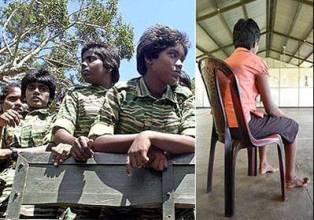|
Matt Wade, May 5, 2009

No place for a child ... (left) Young fighters of the Liberation Tigers of Tamil Eelam in Sri
Lanka, and (right) a 14-year old conscript at the Kegalle district centre. Photo: AP/Gemunu Amarasinghe/Matt Wade
It Is hard to imagine Christine* in combat. But the diminutive 14-year-old with a cheeky smile and
dancing eyes knows how to handle a Kalashnikov and detonate grenades.
A Tamil speaker from northern Sri Lanka, Christine says she was abducted by Tamil Tiger cadres in March and forced to undergo military training. She performed drills using dummy weapons in preparation for battle and, as with many female recruits, her hair was cut short.
"I was full of fear when they came and took me," she said. "I was crying every day."
Sri Lankan commanders on the battle front say they are encountering more and more children as the Liberation Tigers of Tamil Eelam (LTTE) try desperately to stave off defeat. The rebels are trapped on a 4.5-kilometre strip of land on the north-eastern coast of the island.
Major-General Jagath Dias, the commander of the Sri Lankan Army's 57th Division, said his men had been fighting girls as young as 11.
"It's very difficult [to shoot at children] but when someone has a weapon and is firing it at you, it doesn't matter what age, you have to shoot."
His colleague, Brigadier Shavendra Silva, the commander of the army's 58th division fighting on the front line, said "most of" the Tiger cadres captured since April 23 were aged between 11 and 18.
"There were many young girls aged 13 and 14. All of them had short hair," the brigadier said.
"They don't have the numbers of fighters they need so they conscript civilians forcefully."
Sri Lankan officials involved in the rehabilitation of children affected by the war say they have identified about 400 child combatants from among the tens of thousands of civilians who have fled the fighting since April 20.
Officials from UNICEF, the UN's child welfare agency, are also deeply concerned about the apparent rise in the number of child combatants being recruited by the Tigers.
A UNICEF spokesman in Sri Lanka, James Elder, said child combatants bear deep psychological scars. Even those spared from combat lost precious years that cannot be replaced.
"Child soldiers in Sri Lanka live in a theatre of violence and suffering," he said.
"Many in this current conflict may be thrown into the front line at a time of fierce fighting where they can be killed or maimed. Instead of hope, fear defines their childhood. Their recruitment is intolerable."
The Tigers have a long tradition of recruiting child soldiers. UNICEF has recorded more than 6000 cases of children recruited between 2003 and the end of last year.
Christine was saved from the front line by her mother, who managed to smuggle her out of the Tigers' camp about 17 days after she was forcibly conscripted.
But her ordeal wasn't over. She ended up in a refugee camp in the town of Vavuniya where her short hair raised suspicions that she had been with the Tigers. She confessed about her rebel training and was again separated from her family, this time by Sri Lankan authorities.
Christine is one of 58 child combatants who arrived at the protective accommodation and rehabilitation centre in the Kegalle district in the early hours of Friday morning. Here children and young women forced into combat by the Tigers undertake a rehabilitation program.
The arrival of this big group at the camp run by the Sri Lankan Government and UNICEF supports the accounts that the Tigers have committed more children to the front line in recent months.
Soon after arriving at the centre 20 girls, aged between 14 and 18, sat around a large table speaking to a UNICEF social worker about their experience. Some said they were given just seven days training before being sent into combat against well-equipped and battle-hardened Sri
Lankan troops.
Many asked if they could be put in touch with their parents, now in crowded refugee camps across northern Sri Lanka. Deepa, dressed in a frayed olive shirt and skirt, had a heavy limp thanks to a leg injury sustained as she fled. Like Christine, she was also vetted because of her
short hair.
"Please let my father know I am safe here," she asked the social worker.
|
